#between my job and school
Explore tagged Tumblr posts
Text
Trying to knit through the ghost section on my haunted house cowl tonight, I need to finish it soon so I have the needles free for a hat commission later this month.
Tomorrow I work again, but before that I want to make sure that I have time to plot out my work time for making a thermal casserole dish carrier as a gift for a friend.
one of these days I should post my full list of cosplays I want to make so you can all see how out of control I am over wanting to make things lol
#the hat is for my roommate#so I have time but I'd rather get it done soon#and the cowl is my second knit of this pattern because my first one ended up a little on the small side#the casserole carrier is going to be a late holiday gift#I really want to focus on my costume making this year so getting on top of my making schedule is super important#between my job and school#my to make list keeps growing faster than I can keep up with
3 notes
·
View notes
Text
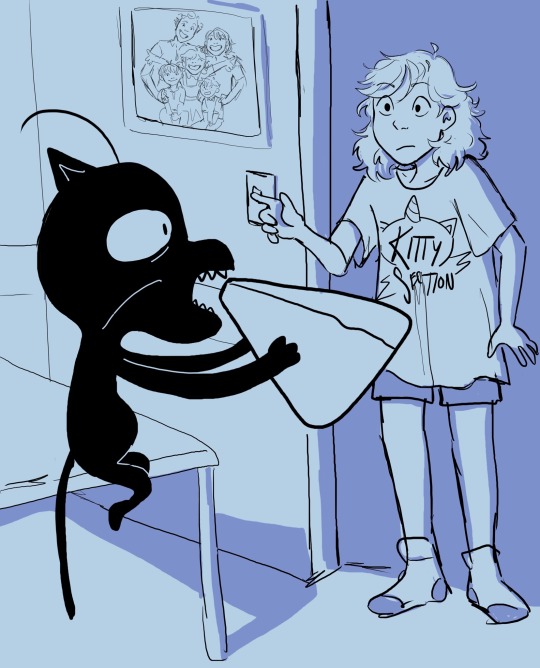
emma dupain cheng on the brain😽🎀
more:
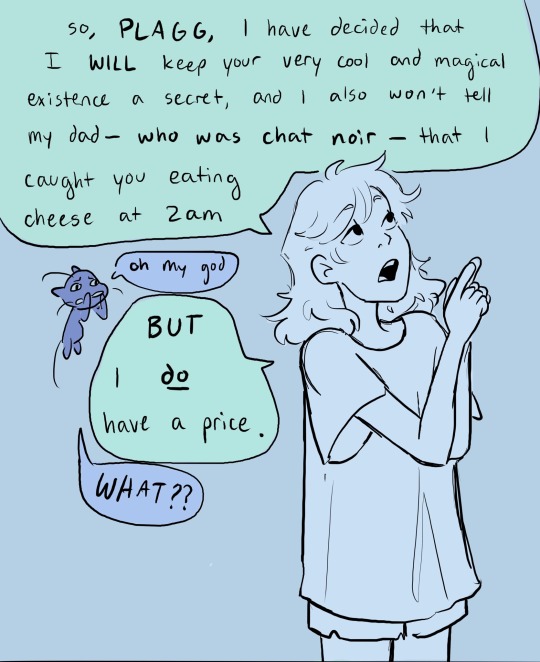
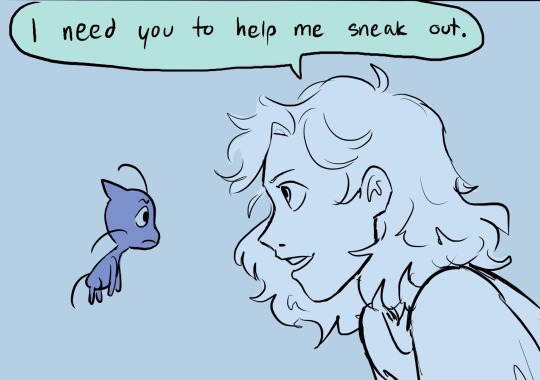
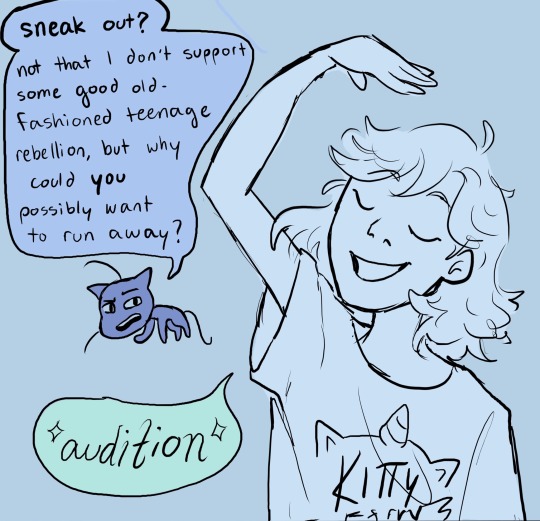
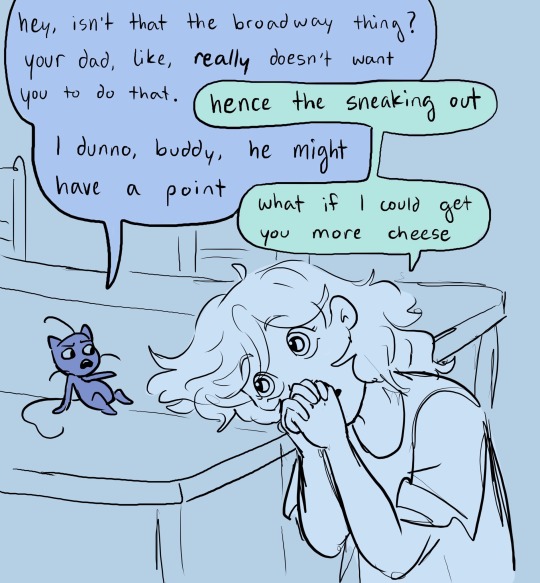
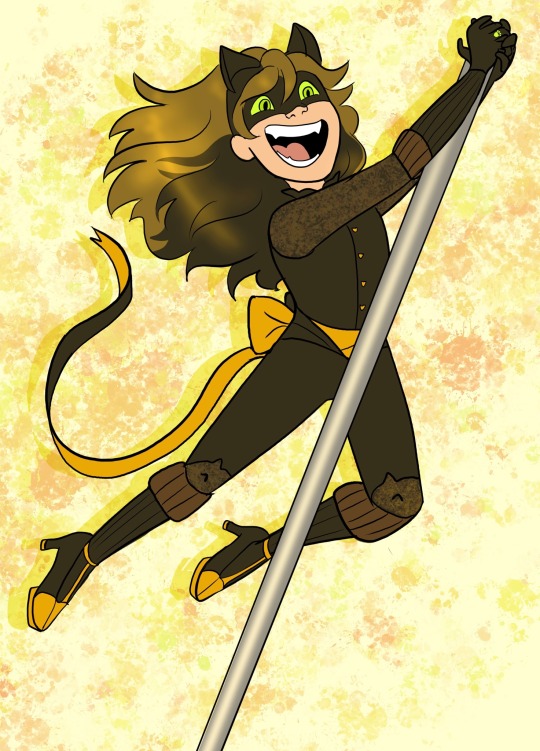
#ml#miraculous#miraculous ladybug#my art#emma dupain cheng#emma agreste#(i think that may the more popular tag for her lol. she is a dupain cheng in my heart though)#plagg#she is thirteen almost fourteen here btw. because i love circularity#emma dupain cheng to me is like. what if emilie or adrien grew up in a stable home with no trauma. that’s emma#and she is theater kid✨#and adrien and marinette are soooo so so supportive and love going to her shows and are so proud of her#/marinette has to be held back from trying to manipulate the school play casting process to secure emma the lead every year#but then emma sets her sights on bigger things(broadway west end)#and adrien pumps the breaks big time#and he’s so torn between supporting her interests and wanting so badly to keep her from like. being a child actor. having a job. b#being pulled from school#and emma gets upset bc he is standing in the way of her dreams#and they fight about it:(#and then emma discovers plagg and convinces him to help her sneak out and go to her callback that she secretly auditioned for#(and forged all the parent signatures for lol)#and. well. plagg CAN be bribed#and also she just reminds him so much of baby adrien🤧 he is a softie#and she runs away to her callback. and adrien and marinette wake up the next morning and see on the news that there is a new chat noir.#anyway. not that i’ve thought about it or anything
5K notes
·
View notes
Text
patience being tested. being forced by a bizarre unfortunate situation to adhere to university requirement technicality by taking this simple basic elementary "introduction to environmental history" class.
this class is from facilitators/program which do, like, "history of the American frontier" or "history of fishing and hunting" and still basically subscribe to that old-school twentieth-century idealization and celebration of characters like Teddy Roosevelt and reverence for a mythical arc-of-history-bent-towards-justice narrative of the often-clumsy but ultimately-benevolent US federal government and its mission to "save nature" through the miracle of "sustained yield," while heroic federal land management agencies and "heritage" institutions lead to way, staffed by exceptional individuals (appeals to nostalgia for the frontier and an imagined landscape of the American West; ego-stroking appeals to flattering self-image that center the environmentalist or academic). where they invoke, y'know, ideas like "ecology is important because don't you enjoy cross-country skiing in The Woods with your niece and nephew? don't you like hunting and fishing?" which makes it feel like a time capsule of appeals and discourses from the 1970s. and it invokes concept of "untouched wilderness" (while eliding scale of historical Indigenous environmental relationships and current ongoing colonial violence/extractivism). but just ever-so-slightly updated with a little bit of chic twenty-first-century flair like a superficial land acknowledgement or a reference to "labor histories" or "history from below," which is extra aggravating when the old ideologies/institutions are still in power but they're muddying the water and diluting the language/frameworks (it's been strange, watching words like "multispecies" and "Anthropocene" over the years slowly but surely show-up on the posters, fliers, course descriptions, by now even appearing adjacent to the agri-business and resource extraction feeder programs, like a recuperation or appropriation.) even from a humanities angle, it's still, they're talking at me like "You probably didn't know this, but environmental history is actually pretty entangled with political and social events. In fact, we can synthesize sources and glean environmental info from wacky places like workers' rolls in factories, ship's logs, and poetry from the era." and i'm nodding like YEP.
the first homework assignment is respond to this: "Define and describe 'the Anthropocene'. Do you think 'the Anthropocene' is a useful concept? Why or why not?" Respond in 300 words.
so for fun, right now in class, going to see how fast i can pull up discussion of Anthropocene-as-concept solely from my old posts on this microblogging site.
---
ok, found some
---
I think that the danger in any universal narrative or epoch or principle is exactly that it can itself become a colonizing force. [...] I’m suspicious of the Anthropocene as concept for the very reason that it subsumes so many peoples, nations, histories, geographies, political orders. For that reason, I think ideas like the Anthropocene can be a useful short-hand for a cluster of tangible things going on with the Earth at the moment, but we have to be very careful about how fluid and dynamic ideas become concretized into hegemonic principles in the hands of researchers, policymakers, and politicians. There’s so much diversity in histories and experiences and environmental realities even between relatively linked geographies here in Canada [...]. Imagine what happens when we try to do that on a global scale - and a lot of euro-western Anthropocene, climate change and resilience research risks doing that - eliding local specificities and appropriating knowledge to serve a broader euro-western narrative without attending to the inherent colonial and imperial realities of science and policy processes, or even attending to the ways that colonial capitalist expansion has created these environmental crises to begin with. While we, as a collective humanity, are struggling with the realities of the Anthropocene, it is dangerous to erase the specific histories, power-relations, political orders that created the crisis to begin with. So, I’m glad that a robust critique of the Anthropocene as a concept is emerging.
Text by: Words of Zoe Todd, as interviewed and transcribed by Caroline Picard. “The Future is Elastic (But it Depends): An Interview with Zoe Todd.” 23 August 2016.
---
---
---
The Great Acceleration is the latest in a series of human-driven planetary changes that constitute what a rising chorus of scientists, social scientists, and humanists have labeled the Anthropocene - a new Age of Humans. [...] But what the Anthropocene label masks, and what the litany of graphs documenting the Great Acceleration hide, is a history of racial oppression and violence, along with wealth inequality, that has built and sustained engines of economic growth and consumption over the last four centuries. [...] The plantation, Sidney Mintz long ago observed, was a “synthesis of field and factory,” an agro-industrial system of enterprise [...]. Plantation legacies, along with accompanying strategies of survival and resistance, dwell in the racialized geographies of the United States’ and Brazil’s prison systems. They surface in the inequitable toxic burdens experienced by impoverished communities of color in places like Cancer Alley, an industrial corridor of petrochemical plants running along the Mississippi River from New Orleans to Baton Rouge, where cotton was once king. And they appear in patterns of foreign direct investment and debt servitude that structure many land deals in the Caribbean, Brazil, and sub-Saharan Africa [...]. [C]limatologists and global change scientists from the University of London, propose instead 1610 as a date for the golden spike of the Anthropocene. The date marked a detectable global dip in carbon dioxide concentrations, precipitated, they argue, by the death of nearly 50 million indigenous human inhabitants [...]. The degradation of soils in the tobacco and cotton-growing regions in the American South, or in the sugarcane growing fields of many Caribbean islands, for example, was a consequence of an economic and social system that inflicted violence upon the land and the people enslaved to work it. Such violent histories are not so readily evident in genealogies that date the Anthropocene’s emergence to the Neolithic Revolution 12,000 years ago, the onset of Europe’s industrial revolution circa 1800, or the Trinity nuclear test of 1945. Sugarcane plantations were already prevalent throughout the Mediterranean basin during the late middle ages. But it was during the early modern era, and specifically in the Caribbean, where the intersection of emerging proto-capitalist economic models based on migratory forced labor (first indentured servitude, and later slavery), intensive land usage, globalized commerce, and colonial regimes sustained on the basis of relentless racialized violence, gave rise to the transformative models of plantations that reshaped the lives and livelihoods of human and non-human beings on a planetary scale. [...] We might, following the lead of science studies scholar Donna Haraway and anthropologist Anna Tsing, more aptly designate this era the Plantationocene. [...] It is also an invitation to see, in the words of geographer Laura Pulido, “the Anthropocene as a racial process,” one that has and will continue to produce “racially uneven vulnerability and death." [...] And how have such material transformations sustained global flows of knowledge and capital that continue to reproduce the plantation in enduring ways?
Text by: Sophie Sapp Moore, Monique Allewaert, Pablo F. Gomez, and Gregg Mitman. "Plantation Legacies." Edge Effects. 22 January 2019. Updated 15 May 2021. [Bold emphasis added by me.]
---
---
---
Geologists and other scientists will fight over [the definition of the beginning start-date of the Anthropocene] in scientific language, seeking traces of carbon dioxide that index the worst offenses of European empire which rent and violated the flesh, bodies, and governance structures of Indigenous and other sovereign peoples in the name of gold, lumber, trade, land, and power. [...] The stories we tell about the origins of the Anthropocene implicate how we understand the relations we have with our surrounds. In other words, the naming of the Anthropocene epoch and its start date have implications not just for how we understand the world, but this understanding will have material consequences, consequences that affect body and land.
Text by: Heather Davis and Zoe Todd. On the Importance of a Date, or Decolonizing the Anthropocene. ACME An International Journal for Critical Geographies. December 2017. [Bold emphasis added by me.]
---
---
---
From Aime and Suzanne Cesaire, C. L. R. James, Claudia Jones, Eduoard Glissant, through Sylvia Wynter, Christina Sharpe, and so many others, critical anticolonial and race theory has been written from the specific histories that marked the Black Atlantic. [...] Glissant also reminds us, secondly, of how cunning the absorptive powers of [...] liberal capitalism are - how quickly specific relations are remade as relations-erasing universal abstractions. [...] This absorptive, relations-erasing universalism is especially apparent in some contemporary discourses of […] liberalism and climate collapse - what some call the Anthropocene - especially those that anchor the crisis in a general Human calamity which, as Sylvia Wynter has noted, is merely the name of an overdetermined and specific [White] European man. […] [T]he condition of creating this new common European world was the destruction of a multitude of existing black and brown worlds. The tsunami of colonialism was not seen as affecting humanity, but [...] these specific people. They were specific - what happened to them may have been necessary, regrettable, intentional, accidental - but it is always them. It is only when these ancestral histories became present for some, for those who had long benefitted from the dispossession [...], that suddenly the problem is all of us, as human catastrophe.
Text by: Elizabeth Povinelli. “The Ancestral Present of Oceanic Illusions: Connected and Differentiated in Late Toxic Liberalism.” e-flux Journal Issue #112. October 2020.
---
The narrative arc [of White "liberal humanism"] [...] is often told as a kind of European coming-of-age story. […] The Anthropocene discourse follows the same coming-of-age [...] script, searching for a material origin story that would explain the newly identified trajectory of the Anthropos […]. Sylvia Wynter, W.E.B. DuBois, and Achille Mbembe all showed how that genealogy of [White subjecthood] was [...] articulated through sixteenth- through nineteenth-century [historiographies and discourses] in the context of colonialism, [...] as well as forming the material praxis of their rearrangement (through mining, ecological rearrangements and extractions, and forms of geologic displacements such as plantations, dams, fertilizers, crops, and introduction of “alien” animals). […] As Wynter (2000) commented, “The degradation of concrete humans, that was/is the price of empire, of the kind of [Eurocentric epistemology] that underlies it” (154).
Text by: Kathryn Yusoff. “The Inhumanities.” Annals of the American Association of Geographers, Volume 11, Issue 3. November 2020.
---
---
---
As Yarimar Bonilla suggests in regard to post-Irma-and-Maria Puerto Rico, “vulnerability is not simply a product of natural conditions; it is a political state and a colonial condition.” Many in the Caribbean therefore speak about the coloniality of disaster, and the unnaturalness of these “natural” disasters [...]. Others describe this temporality by shifting [...] toward an idea of the Plantationocene [...]. As Moore and her colleagues write, “Plantation worlds, both past and present, offer a powerful reminder that environmental problems cannot be decoupled from histories of colonialism, capitalism, and racism that have made some human beings more vulnerable [...].” [W]e see that contemporary uneven socioecologies associated with the rise of the industrial world ["the Anthropocene"] are based [...] also on the racialized denial and foreshortening of life for the sacrificial majority of black, brown, and Indigenous people and their relegation to the “sacrifice zones” of extractive industry. [...] [A]ny appropriate response to the contemporary climate emergency must first appreciate its foundations in the past history of the violent, coercive, transatlantic system of plantation slavery; in the present global uneven development, antiblackness, and border regimes that shape human vulnerability [...] that continues to influence who has access to resources, safety, and preferable ecologies [...] and who will be relegated to the “plantation archipelagoes” (as Sylvia Wynter called them) [...].
Text by: Mimi Sheller. “Thinking Beyond Coloniality: Toward Radical Caribbean Futures.” Small Axe (2021), 25 (2 (65)), pages 169-170. Published 1 July 2021. [Bold emphasis added by me.]
---
---
---
Indigenous genocide and removal from land and enslavement are prerequisites for power becoming operationalized in premodernity [...]; it was/is a means to operationalize extraction (therefore race should be considered as foundational rather than as periphery to the production of those structures and of global space). [...] Wynter suggests that we […] consider 1452 as the beginning of the New World, as African slaves are put to work on the first plantations on the Portuguese island of Madeira, initiating the “sugar-slave” complex - a massive replantation of ecologies and forced relocation of people […]. Wynter argues that the invention of the figure of Man in 1492 as the Portuguese [and Spanish] travel to the Americas instigates at the same time “a refiguring of humanness” in the idea of race. [...] The natal moment of the 1800 Industrial Revolution, […] [apparently] locates Anthropocene origination in […] the "new" metabolisms of technology and matter enabled by the combination of fossil fuels, new engines, and the world as market. […] The racialization of epistemologies of life and nonlife is important to note here […]. While [this industrialization in the nineteenth century] […] undoubtedly transformed the atmosphere with […] coal, the creation of another kind of weather had already established its salient forms in the mine and on the plantation. Paying attention to the prehistory of capital and its bodily labor, both within coal cultures and on plantations that literally put “sugar in the bowl” (as Nina Simone sings) […]. The new modes of material accumulation and production in the Industrial Revolution are relational to and dependent on their preproductive forms in slavery […]. In 1833, Parliament finally abolished slavery in the British Caribbean, and the taxpayer payout of £20 million in “compensation” [paid by the government to slave owners for their lost "property"] built the material, geophysical (railways, mines, factories), and imperial infrastructures of Britain and its colonial enterprises and empire. [...] A significant proportion of funds were invested in the railway system connecting London and Birmingham (home of cotton production and […] manufacturing for plantations), Cambridge and Oxford, and Wales and the Midlands (for coal). Insurance companies flourished [...]. The slave-sugar-coal nexus both substantially enriched Britain and made it possible for it to transition into a colonial industrialized power […]. The slave trade […] fashioned the economic conditions (and institutions, such as the insurance and finance industries) for industrialization.
Text by: Kathryn Yusoff. "White Utopia/Black Inferno: Life on a Geologic Spike". e-flux Journal Issue #97. February 2019. [Bold emphasis added by me.]
#sorry for being mean#instructor makes podcasts about cowboys HELP ME#and he recently won a New Business award for his startup magazine covering Democrat party politics in local area HELP#so hes constantly performing this like dance between new hip beerfest winebar coolness and oldfashioned masculinity#but hes in charge of the certificate program so i have to just shut up and keep my head down for approximately one year#his email address is almost identical to mine and invokes enviro history terms but i made mine long before when i was ten years old#so i could log in to fieldherpforum dot com to talk about enviro history of distribution range changes in local reptiles and amphibians#sir if you read my blog then i apologize ive had a long year#and i cant do anything to escape i am disabled i am constantly sick im working fulltime i have NO family i have NO resources#i took all of this schools graduate level enviro history courses and seminars years ago and ran the geography and enviro hist club#but then left in final semester because sudden hospitalization and crippled and disabled which led to homelessness#which means that as far as any profession or school is concerned im nobody im a retail employee#i was doing conference paper revisions while sleeping on concrete vomiting walking around on my cane to find outdoor wifi#and im not kidding the MONTH i got back into a house and was like ok going back to finish the semester the school had#put my whole degree program and department in moratorium from lack of funding#and so required starting some stuff from scratch and now feel like a hostage with debt or worsening health that could pounce any moment#to even get back in current program i was working sixteen hours a day to pay old library fines and had to delicately back out of workplace#where manager was straight up violently physically abusive to her vulnerable employees and threatened retaliation#like an emotional torturer the likes of which i thought existed only in cartoons#and the week i filed for student aid a massive storm had knocked out electricity for days and i was clearing fallen tree debris#and then sitting in the dark in my room between job shifts no music no phone no food with my fingers crossed and i consider it a miracle#sorry dont mean to dramatize or draw attention to myself#so actually im happy you and i are alive
133 notes
·
View notes
Text
introducing some adults into the au!


Part 1 | Part 2 | Part 4 | Part 5
Au Masterpost
#im not 100% sure about itachis job but ill polish the details as i develop the au :)#hes wearing glasses cause he keeps losing vision#next will be temari and gaara but dont expect them so soon cause im gonna be busy during the week :(#if you have any question about this au. headcanons. relationships between characters. etc. ask me!!!#my art#art#fanart#naruto#naruto shippuden#kakashi hatake#itachi uchiha#high school#high school au#au#alternate universe#digital art#queer#headcanon#trans#gay#bisexual#naruto high school au
63 notes
·
View notes
Text

this does NOT feel like dick grayson to me what the hell??????
#the idea that dick would be so rude as to give alfred more work????#by making a mess in bruce's house??????#and then NOT EVEN APOLOGISING WHEN ALFRED TRIES TO SAY SOMETHING ABOUT IT????????#HIM LOCKING THE DOOR ON ALFRED??????????????????????#y'all for the first time i'm going to say that tom taylor did something right#when he had that interaction between alfred and bby!dick#where dick is washing the dishes and alfred is like 'you do realise that's my job?'#and dick is like 'you realise that i'll never be okay with that?'#hell in robin year one (again direct comparison)#he in part wants to go to a public school to give alfred less work#does he push the line once by putting his shoes near alfred's face? sure#but when alfred says something he apologises and moves his feet away#this is just#GAH#vent //
20 notes
·
View notes
Text
the way the ericson group were at the outbreak just a bunch of troubled kids who made various mistakes or committed crimes and were judged by a system that punished and abandoned them instead of giving them the support and love they needed, are then nearly a decade later put into a situation where now they must judge a troubled child for the mistakes and crimes hes committed against them. and 5 to 3 vote them out 😭
#twdg#i love the way s4 connects back to lees whole 'murderer' thing back in s1 😭 guilt...atonement.....systems of punishment#i love thinking about s1>s4 themes and crying#anyway this is partially why i hate when i see the ericson cast reduced down to 'just some teens' its so much more than that#them being abandoned in a boarding school for troubled kids is SO IMPORTANT its not 'just some school'#anyway its also probably why theyre my favorite cast#theyre literally one of if not the most mature group of the series even while being a bunch of kids who make choices i dont agree with#because they actually love and care about each other. even when theyre mad. because theyre all they have left#i do think the vote was a fair way to handle it even tho i still ultimately find it cruel. they couldve talked it out#but this is still a story that needs conflict to resolve so is what it is#they would rather they leave than have to face their confused feelings. the most immature thing they do. but understandable#they did such a good job crafting that cast for clem GOD an entire ensemble built around her and aj....delicious#zombie/post apoc media about love and community my beloved 😭#sorry but get tf out of here with that 'humans are evil and everyone dies' lame ass bullshit we are nothing without community#the amount of love pouring out of s4 is like getting my ass kicked but then they give me a big hug and kiss after and send me on my way#s4 my absolute beloved i really love it more and more every time. so much to appreciate even with it the way it is#the themes bro the themes........ the connections between seasons 1 and 4 you are everything to me#it speaks
63 notes
·
View notes
Text
HA I WAS RIGHT!!! apparently kui said in a modern au laios would be a minimum wage retail worker
#and falin would be a medical researcher...!!!!#for the fic that i have. yet to write lmao. i kind of had laios bouncing between retail jobs/construction#not going to uni and after he leaves high school (maybe even left in yr 10#side note this takes place in australia lmao.) couch surfs for a while and has trouble finding stable housing (aus housing market is shit)#when falin hears about it she wants to drop uni and help him out but he wont hear it#she suspends her studies for a bit to get him on his feet and they live together in gods tiniest flat#then she goes back to uni and voila. laios is a minimum wage retail worker#im putting this all here because the longer i put off writing it the less likely it is to get written lmao.#the point is ive got my finger on the pulse babey. i know what these characters are about
41 notes
·
View notes
Note
Did you hear of the news?
I have. :(
Everyone else has their tributes so, here, a summary of my experience with Dragon Ball.
I was in fourth grade art class. A kid had the February 2005 issue of Shonen Jump, back when Shonen Jump was still physically printed here. I recognized Atem on the front cover because the Blockbuster around the corner from our house had DVDs (I think they were DVDs and not VHSs then since I distinctly remember it having a menu and special features) of some of the later episodes of Duelist Kingdom and my brother and I watched them on repeat. So I was like oh, hey, what's this? They make books of that stuff? I don't remember the conversation but the kid ended up giving me that issue, and I took it home with me.
There were a LOT of significant, groundwork things happening in that issue, now that I think about it. We were just beginning to see Sanji truly in action against Pearl. The Dark Tournament was in it's early stages still with Roto fucking around and finding out against Kurama. Sakura shears off her hair in a move that rearranged sexualities the world over. The reason Atem was on the cover was because Yu-Gi-Oh Millennium World was just debuting its first and second chapter. Bleach wasn't even serialized yet. And Dragon Ball, of course, was also there, about a hundred and fifty chapters ahead of everybody else.
Keep in mind that this was my first experience with manga, period. So my very first experience with Dragon Ball opened on this:
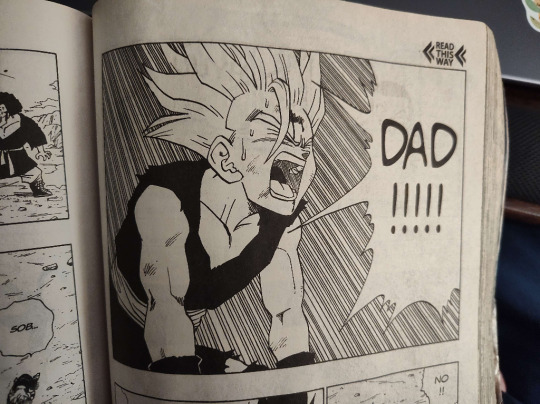
and ended on this:

Yeah. Truth be told, at the time Yu Yu Hakusho piqued my interest more than Dragon Ball (a guy fighting with plants? how creative!) but I never did forget these chapters. I thought the art style was so different from the others.
At some point after this, probably between several months and a year and a half, the TV happened to be on one evening when Toonami was airing Dragon Ball Z. Oh hey, I said, I recognize that art, I know those characters. So I hung around and watched some of episode 281. Two things about watching that episode stick with absolute crystal clarity in my mind to this day. Firstly: Buu choking Vegeta out with his arm freaked me the FUCK out as a child. I could not tell you why I had a fear reaction to it but hey, there you go. The second is this:
Specifically I remember 'You died once. If anything happens to you now, you won't exist anymore. There'll be nothing I can do to bring you back.' Not precisely word for word over the years, but Schemmel's tone of voice on this particular lineread. If I had to guess I'd say it was because at that point in my life, uh, death was kinda permanent? So wait, what do you mean died ONCE. Doesn't that apply to everyone?
This still wasn't enough to get me super invested in it though, it just didn't seem like something that would appeal to me that much. So a couple years go by, I don't think about it all that much, and then of course, TFS hits the scene and drops DBZ Abridged. So you know. As a shithead middle schooler with a shithead sense of humor I thought it was the best damn thing since sliced bread. (My biggest character flaw is that I still think a lot of Season 1 is genuinely funny)
And that was really the extent of my interaction with the franchise for the next several years. Say what you will about DBZA but they did manage to put it all together such that someone who had a nonexistent concept of what the original context was could grok it with not a lot of effort. Some time in high school, I think I was around 15, I decided to bite the bullet and read all the manga, as much to increase the funny factor of DBZA as sheerly for the sake of being able to say I had. Stick it to the other weebs, y'know. Now they can't say I didn't know anything about good anime. This was unfortunately at a time when all that was available online were dirty poor-quality scans and questionable translations, but read it I did. I went 'yep, that sure is about what I expected', and proceeded to get on with my life. GT came and went, I looked up and saw Battle of Gods coming out and went 'oh hey that's still a thing huh', kinda was peripherally aware of all the divisiveness of Super as it was happening, didn't really pay it much attention, just stuck to DBZA and quite a lot of wiki-ing.
And then, this time of year about three years ago now, in the middle of conversation with @prophecydungeon, Dragon Ball somehow came up. Something to do with 'Even though I'm not hugely into DBZ's story or whatever Toriyama does have some great character designs' (yes I was referring to Vegeta and Future Trunks at the time, no i will not stop being predictable, yes i am a parody of myself). They eventually brought up the DBS Broly movie and said, and i quote: 'that was a solid 1.5h of unbelievably fun and wacky animation'. Having seen the Gogeta vs Broly part of it on twitter and been like 'damn that animation's kinda off the hook actually, good for them good for them', my response was to be like. Oh word? I've got a spare hour and a half to kill, sure, fuck it, why not, time to watch DBS Broly.
I think that movie was precision crafted to hit me in the hyperfixation, if we're being honest. Opening on a solid 20 minutes of Lore and Worldbuilding and then having most of the rest of the runtime being mindless slobberknocker fun by way of some of the hardest animation flexes ever? I was done for.
In summation. I have been aware of Dragon Ball for a lot of my life, in that its presence was pervasive and enduring as I grew up. I may have been late to the game of actually wholeheartedly enjoying it, but enjoy it I do. Dragon Ball is the roots of a vast tree of anime, and in reading it I began to understand why that is. I respect it for that, and I love it for that. My current fixation may have shifted, but as far as time devoted to one individual thing goes... it took me a year and a half to watch my way through all of the anime and read all of the manga. ALL of it. So there's something good in there, I'd say.
#rip to a legend#text from the mod#tangentially related: i am not actually dead#it's just that between school and my job and the pirate brainrot#(the previous four months of which was feverishly consumed with a 16k word project)#i have had neither time nor impetus to make dragon ball funnies#there is also the fact that my stupid autism brain is still fuming over the website changes#that have fucked up the Aesthetique of the text posts and made them much more annoying to get in a usable form#thus adding steps to what was a simple and comfortable process#and aforementioned idiot dumb brain has not stopped pitching a bitch fit over the inconvenience.#i know it's a stupid hangup. believe me i am fully aware. but there is so little i can do about it#so i am sorry about my long absence. i really truly am.#especially to the asks that have been chillin in my inbox for all this time now#it's just that they're interesting questions that deserve me giving 100% of my brainpower to them ya feel#i want to devote appropriate attention to these little funnies and not phone it in or half ass it LOL
30 notes
·
View notes
Text
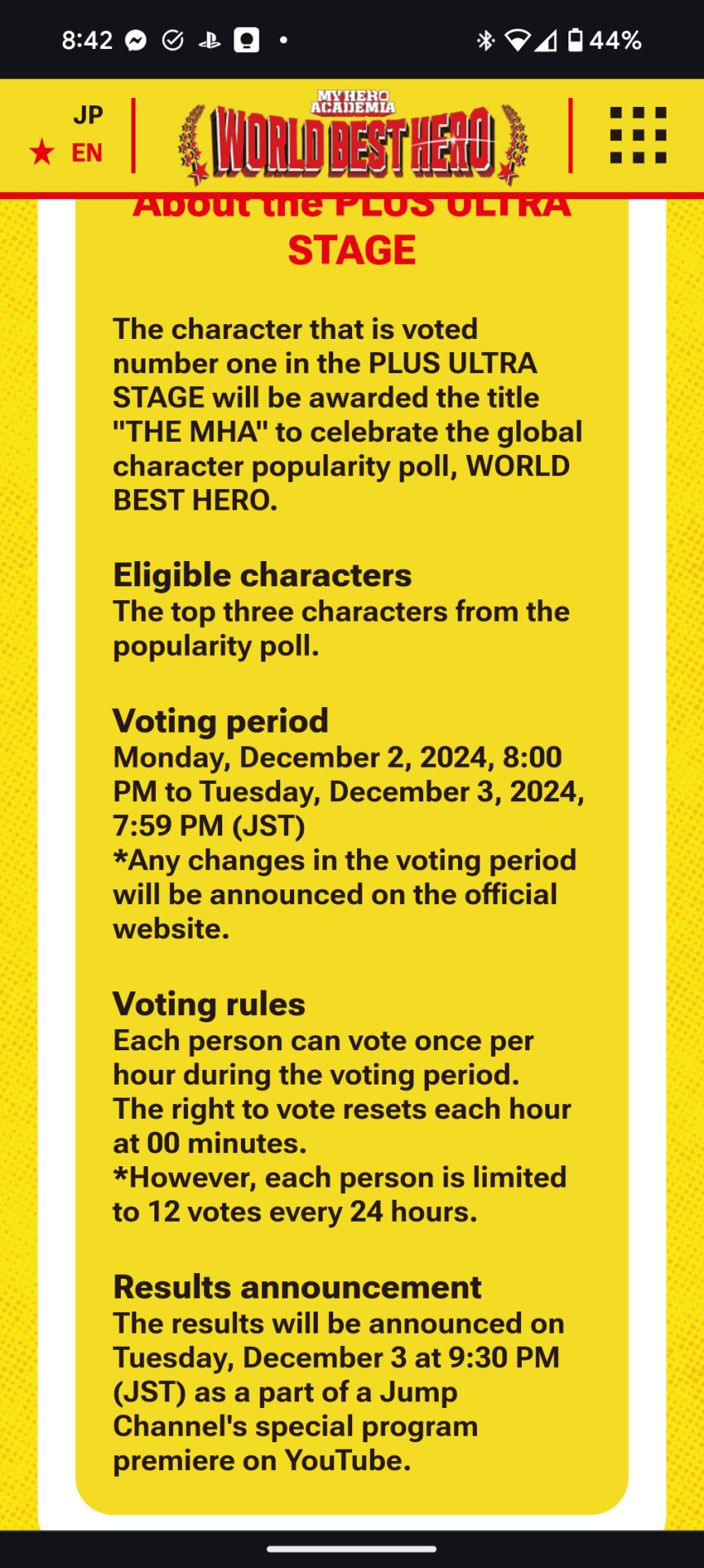
Oh I did Not read these rules until now 😭 ONCE PER HOUR LMAOOOO
#THIS IS GOING TO BE SO CHAOTIC#bkg win tho ♥️♥️♥️♥️#bakugo katsuki#katsuki bakugo#bakugou katsuki#katsuki bakugou#it's gonna be between the big three this is gonna be insane#i believe in us tho katsuki bakugou fans without jobs please vote every hour#or even the ones with jobs who are just so crazy that they will wake up once an hour just to vote because i know there has to be some#or school#whichever#“you bakugou fans get everything let other people have something” no ✨♥️✨ peace and love 💕#bnha#boku no hero academia#mha#my hero academia
18 notes
·
View notes
Text
sometimes i forget that i started this blog to be about philosophy. anyway i've already told all my group chats so here's one for the blog: just got off a video call w the admissions director at my tied-for-first-choice university and i cannot tell if he thinks i have a shot or if im too much of a loser for their very cool program.
he did give me the very good advice to email faculty i want to work with to introduce myself and get to know them and their work, so maybe that's indicative of . good rapport idk
off to write emails and hope professors deign to respond. please i want to keep doing epistemology. what does it matter
#blah blah blah#academia#the joke of the day is consider my nerves WRACKED#ive applied to 4 schools i should apply to more before the window closes in 3 weeks#i fuckin knew this would happen too that id start looking at schools and then not finish the apps until the day before#wish me luck nyall#is this where my academic journey ends? we will find out when they mail out decisions between feburary and april#and if not a phd then i need to invest in a career shift bc while i like my job. i want to be doing something more meaningful#insert line about how everything is meaningful everything matters. thesisposting etc. but what if i want to do something MORE impactful#than renting trumpets to middle schoolers and their families#im pretty sure that my undergrad gpa is going to like. be an automatic disqualification for all the programs#idk if any of you remember 6 years ago but i was Not doing well in undergrad#so im banking on a 'most improved' award when they see my graduate transcript is more than a whole point better#pwease trust me to do even better in the future mistew phd pwogwam pwease bewieve me#<tags that are the reason i do not attach my name face or work to this blog in case i am Located.#<also tags that are very clearly identifiable as mine own. paradoxical choice
7 notes
·
View notes
Text
i think one of the reasons i enjoy the percy series so much is because it’s an adaptation of the novels and not word for word the same.
at first i was a little upset by all the changes, but after rereading the books, i actually like the series even more now. as much as we all adore the books, i think we can agree that they’re not perfect. sometimes there’s plot holes, inconsistencies, or just bad writing in general. this gives rick a chance to fix those things, and that’s OKAY.
the series isn’t perfect either, don’t get me wrong, but it is nice to see the characters going on the same adventures even with some variation to the original story. i think this will allow the characters to be fleshed out more.
we have to remember that a tv show and a book is not the same medium, so the way these things are presented cannot be identical. otherwise the characters in the show would probably seem pretty flat since the books are only from percy’s perspective. the series allows us to learn more about the motives and personalities of other characters, be it annabeth, grover, or luke (personally, i’m really excited to see how his character’s story goes).
anyway, all of this is to say that the percy series is great for what it is (an adaptation of a book series). yes it could be better (cough longer and more episodes cough), but i personally really enjoy it so far.
#like let’s be honest there’s definitely some things from the books that need to be fixed#namely the weird family-but-also-love-interest dynamic between luke and annabeth#luke should not like annabeth romantically At All#i’m really hoping rick fixes that in the show#which i think they have so far…#i think they have more of solely the found family dynamic in the show#i’m really excited to see luke’s character arc#i hated him in the books so hopefully this will change my mind#i think charlie is doing a really good job of portraying him#(god this cast is so perfect tho let’s talk about that)#like that’s the other main reason i love this show#the casting was just so perfect and i can’t imagine anyone else playing these characters now#when i reread the books i literally pictured them as walker and leah and aryan like-#anyway sorry for the rambling i just have fallen in love with this universe all over again#i’m 20 but feel like i’m back in middle school 😭#pjo#percy jackson#percy series#percy jackson and the olympians#annabeth chase#grover underwood#luke castellan#rick riordan#walker scobell#leah sava jeffries#aryan simhadri
32 notes
·
View notes
Note
Wait i just saw your tags that your job is the "do list of tasks until complete then leave" type - what sort of job is it? Bc that sounds amazing tbh
I will say my job isn’t like this ALL the time…maybe like 50-60% of the time
I’m a “pottery operator” at a community art center—but essentially I’m the assistant to the main teacher. I also teach classes, but that’s only a few times a week. The rest of the time my boss gives me a check list of studio chores to do. She is often not there bc she owns her own gallery, so for example every Monday and Friday I spend the whole day just checking off tasks on a to-do list. Things like cleaning and organizing shelves and cupboards, loading kilns (which I LOVE to do, unironically), mix clay, prep clay and tools for lessons, etc etc… and then when I’m done, I can either “lesson plan�� which is usually me looking at pintrist, writing a bit, or working on teacher samples to see how I would demo it (which is very fun to me) or I leave, because I get paid salary, so if the work is done I’m good
So basically it is literally the perfect job for me. The perfect mix of social interaction (and it’s usually with other artistic people), teaching (which I also love to do), and mentally and physically engaging but NOT back breaking menial tasks that I can just check off on a to-do list (and I usually listen to an audio book the whole time..)
So, like, a pretty niche kinda job I guess….but it’s seriously the perfect fit for me
#I also rlly like my boss. we vibe.#she’s older so she can’t do a lot of the physical studio chores anymore so I’m just like hey. give me a list and I’ll do it#so even when she is there I’m usually doin my thang by myself in the studio and she takes care of paper work stuff and emails#I teach classes too but it’s no where NEAR as much work at teaching at a public school. we have like 1 class a day (sometimes two)#like 2-3 times a week and we split that between us#like it is a GOOD gig . especially to me who is obsessed with all things ceramics and clay#it’s a good balance between menial tasks and teaching for me#public school was way too overwhelming for me#also this place gives me time to lesson plan ON THE CLOCK.. they actively say do not do work at home you don’t get paid for#they’re all about mental health and work-home balance#sorry this is probably way more info than u needed#but I’m still just geeked I even have this job. love it#also did I mention I get 45k a year for this on salary and good insurance and 401k#I make more than if I’d used my teaching license …
9 notes
·
View notes
Text
...
#im at such a weird point in my life. trying to choose between a phd and a doomed life as an academic and like just not doing that.#its crazy how not terrible i feel when im not in school. just give me tasks to do and i will do them. dont let me think.#but then im just avoiding my responsibilities. i dunno. i just feel like i would be happier with a structured job that ends when the day#is over. which is y my dad thinks i should get a government job. one of my former lab mates got a government job and he's settling into#spending the rest of his life out in Colorado. which is so weird. i dont kno how long ill be in the place im in now. will it b 4 more years?#or will it be only a few months? will i go back to school in the fall? its looking like yes bc i dont have a job lined up. but maybe ill#keep applying and dip out. let my dreams die in favor of balance and sanity. maybe some things arent meant to be.#its just so gutting. i was talking to my coworker this week. saying that im interested in so many things. i could have studied anything else#and traveled a completely different path. and a guy across the room was like: its never too late. but it feels like its too late. too late#to spend another impossible amount of money on getting a different degree. restarting on a second masters project. im almost 30.#im supposed to b saving money so that i can not work forever. but i cant do that if im just a student forever. so maybe i should just get a#job. god. but theres so much i still want to learn. and im in the perfect program for everything i thought i wanted. im in the perfect place#but everything's falling to pieces. whatever. i. just tired bc im on day 5 of work and have to go in for a day 6.#doing something i havent done before all day. but after than im going home for a week. so ill have lots to contemplate in the airport.#this is not how i thought things would turn out. but im glad im spending the summer working where i am. im learning lots on a human to human#level. and no one bleieves im 27 bc i apparently have a bby face lol. nope im 11 yrs older than u my 16yo coworker#unrelated
17 notes
·
View notes
Text
Considering the. Ahem. Ways this year has gone, I've not been thinking about it all that much, but. I did start this year with the motto of Year Of Unfucking My Life. With a few goals involved in that.
I got an official adhd diagnosis, as well as a diagnosis for PCOS. Other diagnoses in progress. Gotten adhd meds and birth control to regulate periods. I've gone back to school and I'm keeping up with it better than ever before. I've even been working on practicing driving, something I've been largely neglecting since I first got my driving permit, um... 11 years ago...
I just need to actually Get my license. And I need to get it before the end of the year. If I can accomplish that, then I'll say the Year Of Unfucking My Life was successful.
#speculation nation#i had some pretty major negative And positive influences for this goal of mine.#primary negative influence of course being my dad abruptly dying.#but that also led to the primary positive influence of the life insurance payout that's letting me just focus on school for my final year.#it's like a monkey's paw curl kind of moment. i got a genuinely astounding amount of money#more than enough to live off for a year+ and pay off the rest of my schooling.#with this i have finally exited the purgatory of part time school full time work to pay my way through school#a setup that led to endless stress (both physically and mentally) and suffering grades.#failing some classes and taking longer bc part time Anyways. locking me into years and years of this perpetual fucking Hell.#ive escaped it. school is so so so much more manageable when i dont have to work a job. im actually keeping up with my assignments.#for once theres no uncertainty about passing any of my classes. i Will pass them all. and i expect As in most if not all of them.#it's been fucking Amazing. everything i couldve wanted. and it came with the low low cost of losing my father when i was only 26.#... 'low' being sarcastic here of course. he was the 2nd worst person i couldve lost in my life. second only to my sister.#the 2nd worst grief i will Ever experience. bc he was my Good parent. hes the very reason i have a future at All.#and losing him fucked me up Severely. im still working on recovering. i kind of figure i always Will be.#thank god id already been taking spring semester off bc that would've been Horrible to go thru while in school.#i honestly probably would've just withdrawn from the semester. theres no Way id have kept up with it#given how damned BUSY those first few weeks after were. between funeral prep and inventorying and packing up his house.#so fucking much involved in settling an estate. and im the lucky one in that my sister's been handling all the legal shit.#so i simultaneously was dealt one of the most severe blows i ever Will be dealt#while also being given probably the biggest boost i'll ever get in my life.#if everything goes well with graduating and getting an IT job then i'll never want for money again.#considering there was a time early last year when i got as low as literally $7 in my bank account. this is a pretty big deal.#it's just... strange. the ways things go in life. this has been a very strange year for me.#just doing my best to use this boost to the best of my ability. even if it feels like im taking advantage of his death.#it's what he wouldve wanted me to do.
10 notes
·
View notes
Text
Against my better judgement I'm watching more of the 2016 ppg reboot and lemme tell you something. I HAAAAAAATE the way they write Utonium I HATE IT!!!
But sometimes there'll be a little moment here or there where he's kinda...cute > ^ <
#jane journals#self insert talk#🔬 starkissed scientist 🔬#ONCE IN A GREAT WHILE THERE'LL BE A VERY RARE W#like the one i just watched on recommendation from my partner where bubbles doesnt feel cute anymore cause she took a bad school photo#and woww they CAN write him being a good dad for once!! 🙄🙄🙄#not like good dad is a CORE PART OF HIS CHARACTER#but he reminds her that being cute is just ONE facet of what makes her a wonderful person#and then he brings her close and says 'between you and me you're the cutest one in the world!' UGGGHH#YOU CANT DO THAT YOU CANT TRICK ME LIKE THAT!!!!#and in the one i currently just finished he had a. job interview?? i guess he DOESNT get paid by the government#but the lady doing his interview said that they 'really love his work' and he BLUSHED ugghgh#fuck this show. ESPECIALLY FUCK IT FOR HAVING /SOME/ MOMENTS I ACTUALLY LIKE!!!!!#also it seems weird to me that bubbles would become so hung up on being cute#in the og its not like she's consciously being cute because its her THING she just IS#shes naturally innocent and good hearted ie CUTE#idfk#oh also buttercup pulls out a bucket list and the first thing is 'yell at a bird'#and ngl that made me blow air out of my nose ajfkf#ugh i could say a lot more but im not gonna
15 notes
·
View notes
Text
yall ever get so stressed that you stay up a bit to late, have a dream that you've cheated on your partner and also seen them die, have to deal with clients at work and making an error, have three presentations due, and then wonder why your eye is twitching?
#I just have to remind myself that this was a choice#i did this to myself#grad school#like I have a full time and part time job#and im a full time grad student#I can do it#I know I can#im just in the phase of balancing it all out#and good lord#going through my Alexander Hamilton era#im writing like 3000 words a day between classes#thesis#and life#good lord#light academia#pls help#chaotic academia#dark academia#studyblr#grad studyblr#grad student#grad studies
9 notes
·
View notes